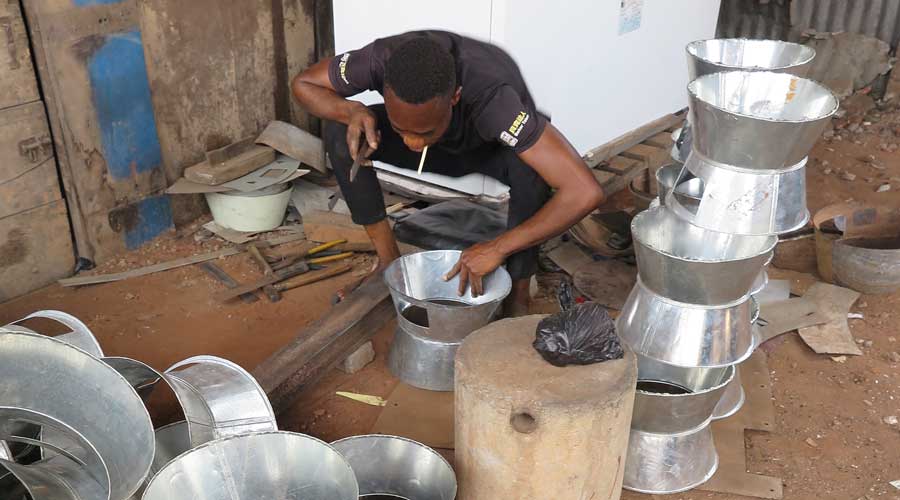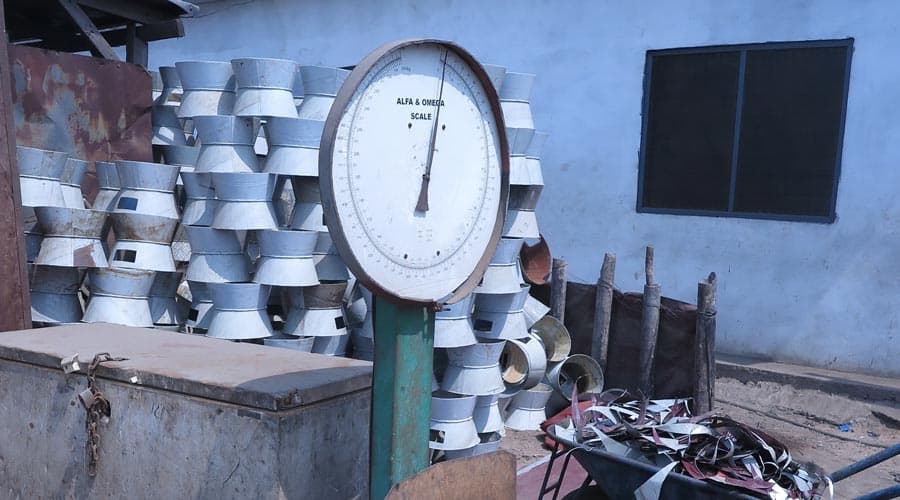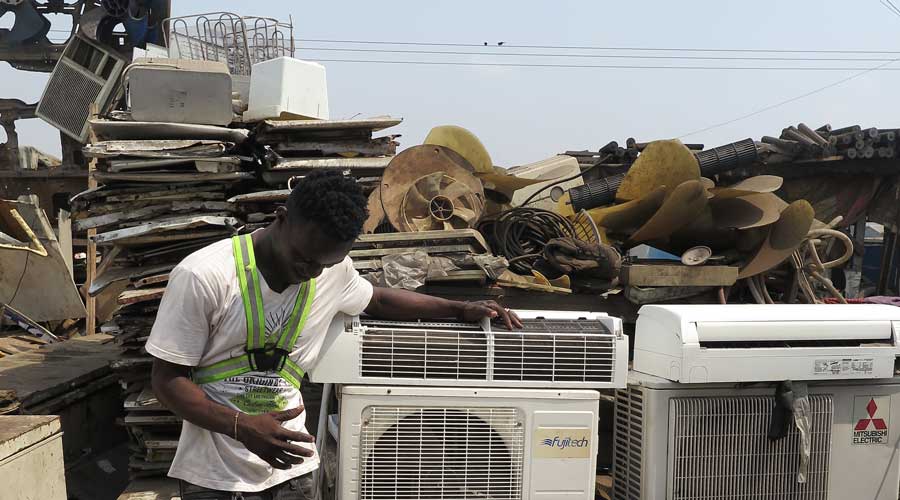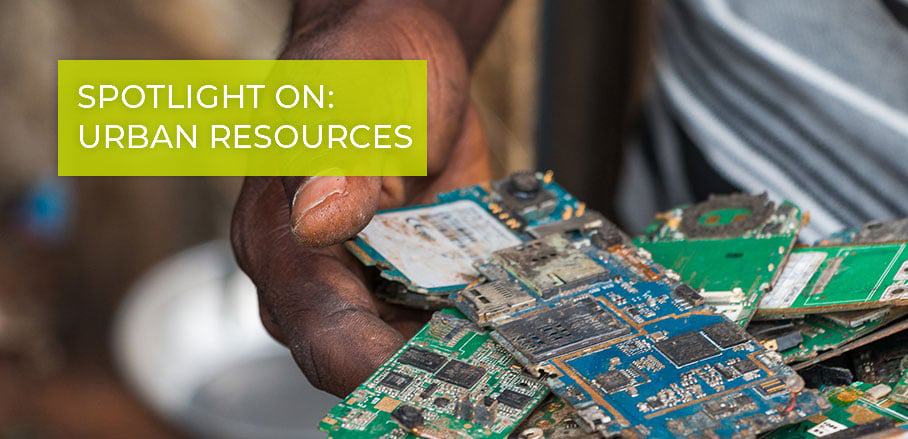Urban Mining in Ghana
Analyses of Ghana’s e-waste import tend to focus on the dangerous effects of its informal processing. Richard Grant and Martin Oteng-Ababio employ the concept of urban mining to take a more differentiating look at a thriving informal economy.
Waste is one of the global economy’s last great frontier, a dirty by-product of industrial capitalism that needs to be disposed of and kept out of sight. E-waste’s annual accumulation is equivalent to the weight of 5,000 Eiffel Towers. Most policy studies focus on its toxicity, environmental damage, and adverse health implications, particularly in importing countries where basic processing occurs. Meanwhile, another perspective hones e-waste as a resource with reservoirs of secondary ores and reusable fractions of metals and rare earths.
The concept of urban mining alters the conventional view of mines located in far-flung, rural places. Yet, some similarities between rural and urban mines can be sketched: valuable materials are pre-processed; contamination occurs to groundwater and sites, and international and artisanal (informal) firms participate. However, urban ore is richer, of more predictable quality, and easier to access. Technologies used for extraction are far more basic in urban mining but equipment for smelting/refining ores is similar.
The Invisible Economy of Agbogbloshie
Old Fadama is an adjacent high-density slum of Agbogbloshie. Crammed on the mouth of the Odaw stream, on piles of compacted waste, it epitomises the locale’s compromised and precarious existence. Space is scarce and is invented; alleys are less than a metre-wide creep between wooden structures whose occupants live in constant fear of the next flood, fire, or municipal directive that will sweep them away. But behind the rickety settlement of rust and waste, urban mining activities occur at a feverish pace.
For twenty years, Agbogbloshie has continued to be tagged as a polluted slum. A world of work performed by inhabitants for their own survival as well as their urban economy and international scrap market contributions remain invisible. Municipal authorities oscillate between benign neglect and open hostility. For example, after the urban floods of June 2015 that killed 250+ residents, Agbogbloshians were labelled as villains rather than victims of non-existent infrastructure, planning, and services. As urban scholars, we are perplexed by such ignorance of a widely accepted understanding of informality.
While the government is impotent to affect sustainable e-waste policy, urban authorities exert control with selective planning enforcements such as banning e-waste push carts and dumping building rubble at the scrap site, signalling an alternative scrapyard future. Selectively ignored is the fact that Agbogbloshie provides approximately 4,500 residents with possibilities to invent a living and contribute over 200,000 US dollar in economic activity. Highly integrated and well-organised, Agbogbloshie connects communities of practices in repairs, reuse, and material recovery. Onsite it has enabled waste to be refashioned into new products like aluminium and coal pots.

© Richard Grant and Martin Oteng-Ababio
Affordable imports and second-hand markets have enabled more Ghanaians to partake in the information and communications technology (ICT) revolution. However, failures in formulating an integrated e-waste management system combined with the dereliction of investment in end-of-life infrastructure create opportunities for speculators to exploit legislation loopholes to illegally import non-functional and irreparable electronics, thereby shifting the urban mining burden to low-cost, out of sight, processing hubs.
Ghana’s Largest Urban Mine
This informal mine is organised under the auspices of the Greater Accra Scrap Dealers’ Association. Most workers are under 25 years; many are migrants from the Dagomba ethnic group from Northern Ghana. With little or no formal education, workers honed skills through informal apprenticeships and learn-by-doing. Average monthly income is 182 US dollar, generated mostly from e-waste buying and selling. By contrast, local ethnic groups (Gas and Akans) avoid this activity, viewing it as an extension of domestic waste (locally called ‘bola’). Other scrapyard workers operate unaffiliated, for example women, transport operators, and immigrants from Nigeria, Mali, and Benin.

© Richard Grant and Martin Oteng-Ababio
Agbogbloshie presents an ever-evolving urban mining chain: collectors, dismantlers, copper burners, refurbishes, support services providers, and metal traders that sell to scrap exporters. Collectors, entry-level individuals, use hand carts and trucks to sift throughout the urban environment for discards. Operating territorial collection routes, they buy e-waste along the route, selling to intermediate scrapyards to save transport costs, the latter selling accumulated bulk to larger hubs.
Dismantlers disassemble e-waste to retrieve reusable components like circuit chips or hard drives for sale to refurbishers. Other recyclable materials such as plastic and glass are traded to wholesalers, recyclers, and scrap-dealers. Refurbishers either reuse retrieved parts to create “new” non-branded computers and/or repair non-functioning equipment (computers, televisions) for the second hand market, extending the life of electronics. Recyclers (locally called ‘burners’) engage in open incineration (relying on insulation foam from refrigerators, or old car tires to fuel fires) to retrieve metals for sale to middlemen and scrap-dealers.

© Richard Grant and Martin Oteng-Ababio
Middlemen operate as the link between the site and formal firms and scrap-dealers, who specialise in copper wires and other metals. Scrap-dealers engage in metal trading mostly through agents and supply inputs for local manufacturing industries such as steel rolling mills, enabling a reduction in the domestic cost of production. Finally, exporters operate at a distance from the hub, and trade with clients and refineries abroad who extract gold and other fractions for new rounds of manufacturing, particularly in products that incorporate second-hand metals such as golf clubs or kitchen appliances.
Can Urban Mining be More Sustainable?
Metals can be recycled and reincorporated into new production processes, thereby offering potential for IT and mining companies to harness themselves to the green economy, and help counterbalance their negative impact on environments. But there are unknowns. The secondary scrap metal market, known to be volatile and dependent on the price of primary equivalents, would need stabilisation. Additionally, it cannot be predicted how the informal economy will be supported to participate in the green economy. Deploying green technology at the local level and linking waste to industrial symbiosis initiatives would be a welcome new direction that could move the e-waste system in its entirety along a sustainable pathway.
